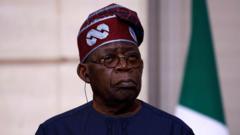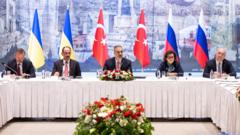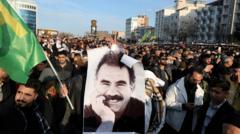Critics argue President Bola Tinubu's recent cabinet appointments disproportionately favor the Yoruba ethnic group, igniting fears of ethnic dominance that could destabilize national unity in Nigeria, Africa's most populous nation.
Nigeria's Ethnic Tensions Intensify Amid Presidential Appointments

Nigeria's Ethnic Tensions Intensify Amid Presidential Appointments
Concerns are rising over President Bola Tinubu's appointments favoring the Yoruba ethnic group, threatening Nigeria's delicate balance of representation.
In Nigeria's political landscape, the delicate dance of ethnic and religious representation has long been a guiding principle for presidential appointments. However, recent appointments made by President Bola Tinubu have led to escalating concerns that this balance is under threat. The Nigerian Constitution mandates regional representation within cabinet positions, but the unwritten rules that guide key appointments have historically aimed to foster a sense of national unity amidst the country's complex ethnic fabric.
The criticism of Tinubu's selections, particularly over perceived favoritism towards the Yoruba ethnic group, is not unfounded. Since his election two years ago, the president, a southern Muslim, has drawn fire for decisions that some believe deviate from the established norms of diversity. A notable early indication of this was his choice of a Muslim running mate from the north in what typically would be a mixed Muslim-Christian ticket—an approach consistent with Nigeria's roughly evenly divided religious demographics.
The scrutiny surrounding Tinubu's appointments has intensified, particularly as they relate to key positions which include the heads of crucial state institutions like the Nigerian National Petroleum Company (NNPC), the police, and the Economic and Financial Crimes Commission (EFCC). Political analysts identify these roles as paramount for governance, controlling vital financial and security structures.
Since taking office, all eight of the most critical roles within Tinubu's administration have been occupied by individuals of Yoruba descent. This stark dominance raises alarms, especially when juxtaposed with the more balanced representation noted during the early terms of his predecessors. Previous leaders Goodluck Jonathan and Muhammadu Buhari managed to cultivate a diverse leadership from multiple ethnic backgrounds, with no single group commanding such a majority.
Concerns extend beyond historical context; many fear the long-term implications for Nigeria’s unity. History professor Tijjani Naniya warns that the trend of ethnic favoritism could alienate significant portions of the population, particularly if future leaders follow suit and continue this pattern.
The discontent is palpable among northern communities, where there is a growing perception of marginalization. Key appointments, especially the controversial replacement of Abdulrasheed Bawa at the EFCC, have sparked discussions about meritocracy versus the political maneuvering of ethnic loyalties.
Tinubu's administration asserts that all regions are represented fairly, pointing to a broader list that includes a notable number of appointments across various sectors. However, discrepancies in counts have led to distrust, and scrutiny persists, even from within his own political party. Critics within the All Progressives Congress echo similar concerns about inclusivity.
In light of the current situation, there is a call for a shift in perspective; some political analysts and aides suggest that the paramount concern should be the competency of appointees over their ethnic background. However, many Nigerians believe that overcoming entrenched ethnic affiliations in political appointments is a distant goal, contingent on the emergence of leaders who prioritize inclusivity through consistent practices across terms.
As dissatisfaction simmer, the unfolding developments in Nigeria's political appointments meritoriously highlight the pressing need for a more equitable representation that embraces the nation's ethnic diversity, a fundamental pillar for national cohesion and democracy.



















